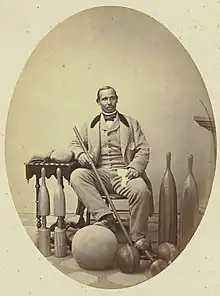Aaron Molyneaux Hewlett | |
|---|---|
 1866 | |
| Born | 1820 |
| Died | December 6, 1871[1] |
| Occupation(s) | Instructor and superintendent of physical education |
| Known for | First African American instructor at Harvard University |
| Spouse | Virginia Josephine Lewis |
| Children | 5, including Virginia Hewlett Douglass, Emanuel D. Molyneaux Hewlett |
Aaron Molyneaux Hewlett (c. 1820–1871) was the first African American instructor at Harvard University and oversaw the college's gymnasium.[2] He was the first superintendent of physical education in American higher education.[3] Hewlett was instructor and curator of the College gymnasium from its construction in 1859 until his death in 1871.[4][1]
Biography
Hewlett lived in Brooklyn before his job at Harvard.[3][5] He worked as a porter but also taught boxing and wrestling.[6] The New York Clipper, the leading New York sports paper, considered him "one of the best boxers in Brooklyn." in 1854 he quit his job as a porter and opened “Molineaux House,” a sparring academy, at his residence.[6]
Hewlett's instruction included the use of exercise equipment and clubs in order to strengthen the body.[4] The 1866 portrait of him and his equipment, taken by George Kendall Warren, is the first known photograph of a medicine ball in the United States.[7] After Hewlett had been working at Harvard for ten years, a local Boston paper commented that Harvard's "Athletics have come almost to rank with Mathematics."[6]
Hewlett participated in civic life and stood up for his rights. In addition to his work at Harvard, Hewlett was also partial owner of a clothing and variety store on Brattle Street in Cambridge where he sold gymnastic equipment.[8] When he and his daughter were denied their seats at the Boston Theater in 1866, he petitioned the Commonwealth of Massachusetts to better enforce its own laws and revoke the licenses from establishments that illegally discriminated against African Americans.[9][10]
Personal life
Hewlett was born in New York, to Isaac and Rachel Hewlett.[11] He married Virginia Josephine (née Lewis) Hewlett, who was also a physical education instructor.[1][12] They had five children: Virginia Hewlett Douglass, a suffragist who married Frederick Douglass Jr.; Emanuel D. Molyneaux Hewlett, who became the first black graduate of the Boston University School of Law; Aaron; Paul Molyneaux, who became a renowned Shakesperian actor; and Aaronella.[2][12][13]
The New York Times published an editorial in 1916 about the "boxing revival" of the time at Harvard, mentioning Hewlett – deceased for over forty years – as a prize fighter and a "midnight Mars" who came to Harvard from "the traditions of the ring."[14] Emanuel Molyneaux called the editorial "uncomplimentary" and denied that his father had been a prize fighter.[15]
References
- 1 2 3 "General information about Aaron Molyneaux Hewlett and Madam Molyneaux Hewlett, 1861-". Harvard University Archives. Harvard University. Retrieved 23 February 2019.
- 1 2 Kelly, John (2018-02-13). "Perspective - D.C. law said African Americans could eat anywhere. The reality was different". Washington Post. Retrieved 2019-02-23.
- 1 2 Sajet, Kim (2016-08-19). "Why We Have to Play Catch-up Collecting the Portraits of Female Athletes". Smithsonian. Retrieved 2019-02-23.
- 1 2 Gerald R. Gems; Linda J. Borish; Gertrud Pfister (15 November 2018). Sports in American History: From Colonization to Globalization. Human Kinetics. ISBN 978-1-4925-8614-2.
- ↑ "Correction". The Evening Gazette. August 12, 1869. Retrieved 23 February 2019.
- 1 2 3 Moore, Louis (2011). "Fit for Citizenship: Black Sparring Masters, Gymnasium Owners, and the White Body, 1825–1886". The Journal of African American History. University of Chicago Press. 96 (4): 448–473. doi:10.5323/jafriamerhist.96.4.0448. ISSN 1548-1867. S2CID 141782656.
- ↑ Fleming, David; Croner, Ken (2012-07-10). "THE BALL THAT JUST WON'T DIE". ESPN.com. Retrieved 2019-02-23.
- ↑ "Old Cambridge Clothing and Variety Store advertisement". The Harvard Advocate. 1 (1): 15, 31, 47, 63. May 11, 1866. Retrieved 27 February 2019. See also ,
- ↑ Millington Bergeson-Lockwood (June 2015). "We do Not Care Particularly about the Skating Rinks". Journal of the Civil War Era. 5 (2): 254–288. JSTOR 26070303.
- ↑ "Freedom's Agenda: African-American Petitions to the Massachusetts Government 1600–1900" (PDF). Commonwealth Museum. Retrieved 23 February 2019.
- ↑ "FamilySearch - Massachusetts Deaths, 1841-1915". FamilySearch.org. 2016-04-12. Retrieved 2019-02-28.
- 1 2 "Aaron Molyneaux Hewlett". Find A Grave. Retrieved 23 February 2019.
- ↑ Bernier (2018). If I survive : Frederick Douglass and family in the Walter O. Evans collection : a 200 year anniversary. Edinburgh: Edinburgh University Press. p. 26. ISBN 978-1-4744-3973-2. OCLC 1049268266.
- ↑ "Fists As Rent". New York Times. February 13, 1916. p. 14. Retrieved 27 February 2019.
- ↑ "The Late Prof. Molyneux Hewlett". New York Times. February 23, 1916. p. 12. Retrieved 27 February 2019.